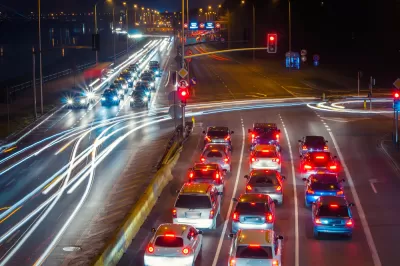Hyperloops and wider highways don't shrink commute times, the real factor in how long people will drive is how long people are willing to drive.

The Hyperloop is a compelling idea, and it has led to a lot of expansive thinking about the future of life and transit, but it's not going to shorten the average American commute, according to the case made by Emily Badger in the New York Times. Even if the Hyperloop ever does get built (a big if) it's unlikely to change the length of the average American commute or even the commute of the town in which it gets built. Because more infrastructure doesn't mean shorter commutes, and it never has.
Commute times have held relatively steadily across time and geography. "Of course plenty of workers trek less or much more, but average American commute times have budged only modestly over the last 35 years, since the census began asking about them," Emily Badger writes. She goes on to point out average commute times around the globe generally sit close to this number as well. None of this is to say changes in travel infrastructure can't change people's lives. They may make us safer, change the places we live, work and entertain ourselves. Even if the Hyperloop comes to fruition, which Badger calls a "wild hypothetical," it won't change the length of our average commutes.
FULL STORY: Why Even the Hyperloop Probably Wouldn't Change Your Commute Time

Maui's Vacation Rental Debate Turns Ugly
Verbal attacks, misinformation campaigns and fistfights plague a high-stakes debate to convert thousands of vacation rentals into long-term housing.

Planetizen Federal Action Tracker
A weekly monitor of how Trump’s orders and actions are impacting planners and planning in America.

In Urban Planning, AI Prompting Could be the New Design Thinking
Creativity has long been key to great urban design. What if we see AI as our new creative partner?

King County Supportive Housing Program Offers Hope for Unhoused Residents
The county is taking a ‘Housing First’ approach that prioritizes getting people into housing, then offering wraparound supportive services.

Researchers Use AI to Get Clearer Picture of US Housing
Analysts are using artificial intelligence to supercharge their research by allowing them to comb through data faster. Though these AI tools can be error prone, they save time and housing researchers are optimistic about the future.

Making Shared Micromobility More Inclusive
Cities and shared mobility system operators can do more to include people with disabilities in planning and operations, per a new report.
Urban Design for Planners 1: Software Tools
This six-course series explores essential urban design concepts using open source software and equips planners with the tools they need to participate fully in the urban design process.
Planning for Universal Design
Learn the tools for implementing Universal Design in planning regulations.
planning NEXT
Appalachian Highlands Housing Partners
Mpact (founded as Rail~Volution)
City of Camden Redevelopment Agency
City of Astoria
City of Portland
City of Laramie





























